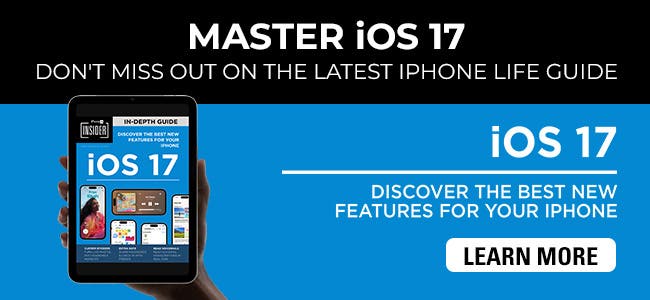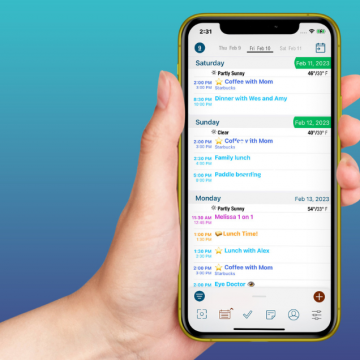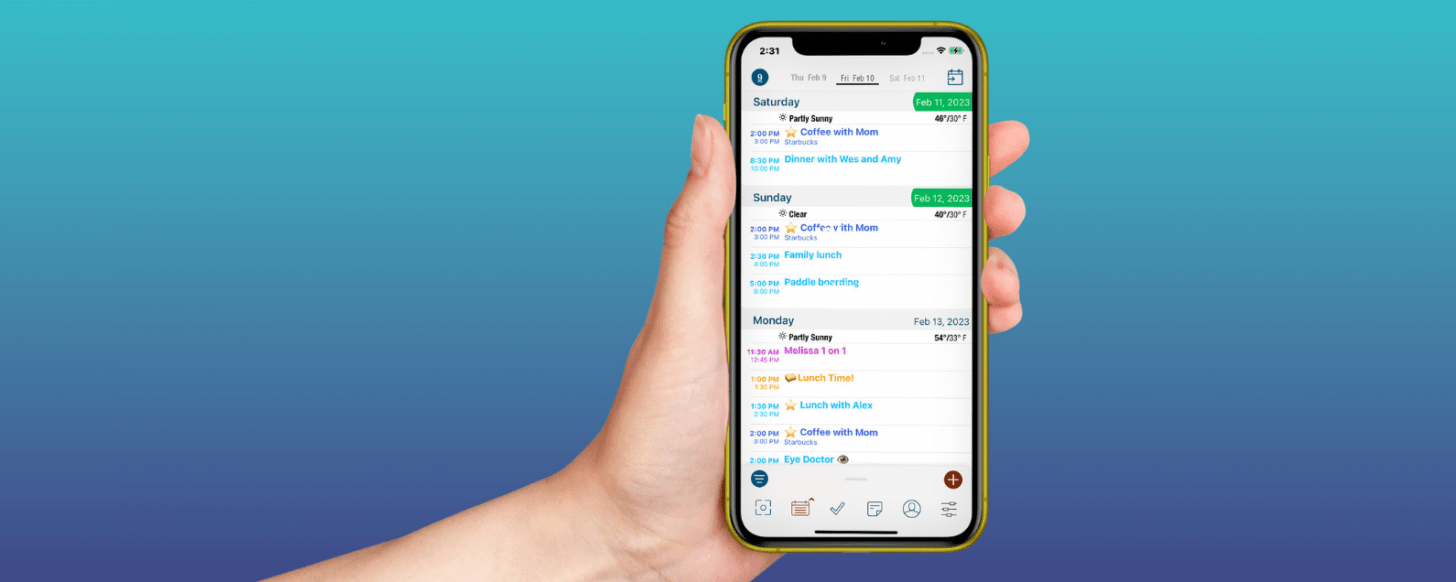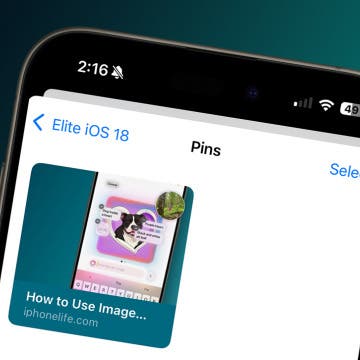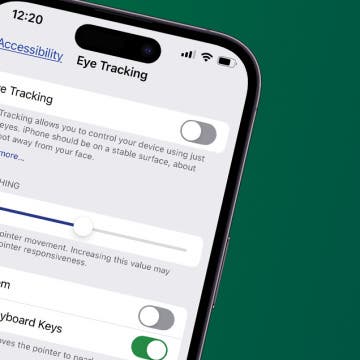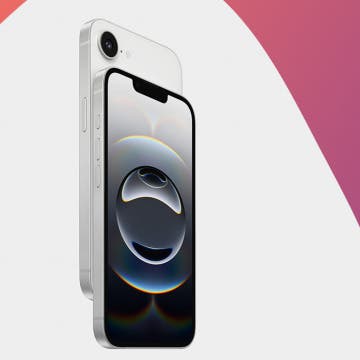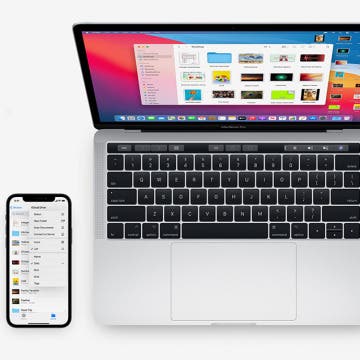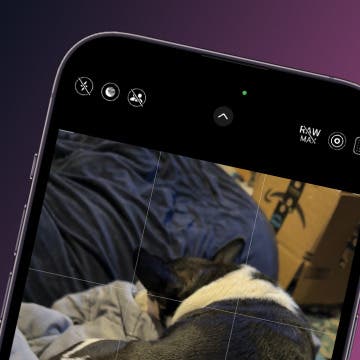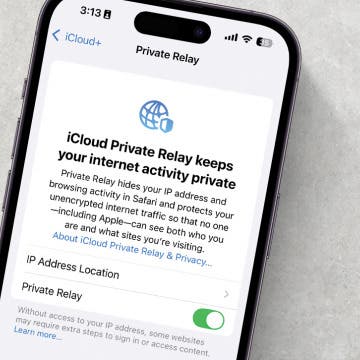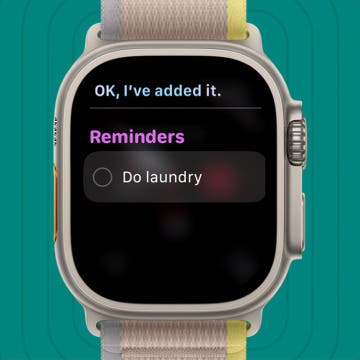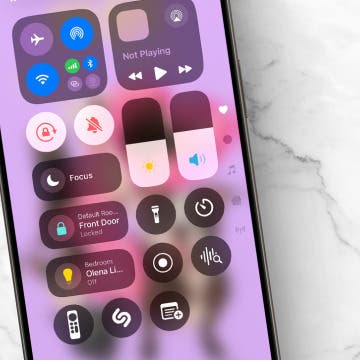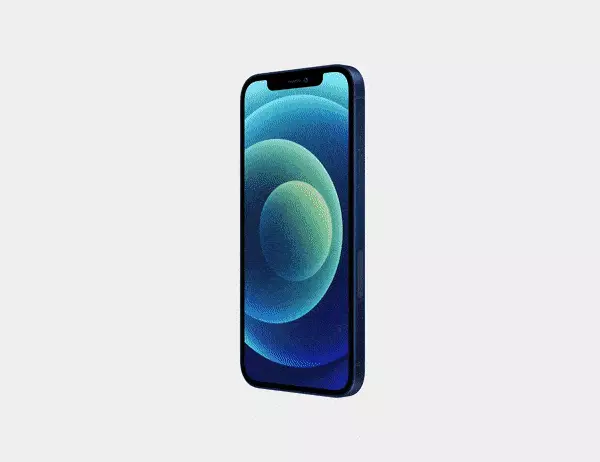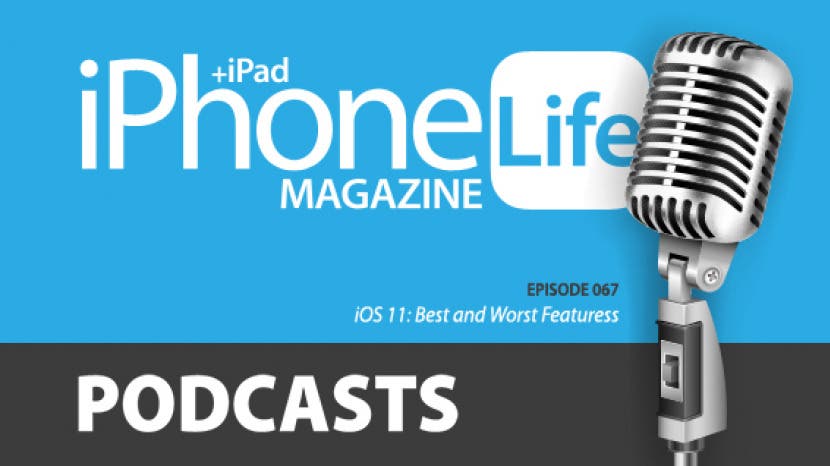
In the 67th episode of the iPhone Life Podcast, the team shares their most loved and hated features of iOS 11 (spoiler: Donna's a big fan of Drag and Drop and Sarah loves lane guidance in Apple Maps). They also address concerns about the privacy and security of the iPhone X's Face ID feature and teach you how to optimize your storage with iOS 11.
Click here to listen and subscribe. If you like what you hear, be sure to leave a review. And remember to tune in every other week to hear our editors share with you the latest Apple news, best apps, iPhone tricks, and coolest accessories.
This episode is brought to you by TPO. Whether you need a cellular plan for your iPad or want to ditch your current iPhone carrier, TPO Mobile is the solution you’ve been dreaming of, with free SIM cards for your unlocked device and various plans to suit any user. But the best part about a plan with TPO Mobile is that 10 percent of your monthly bill will go to a cause you love and believe in.

This podcast was recorded using high-quality microphones from Blue Microphone.
Question of the week:
What are your favorite iOS 11 features? What are your least favorite? Email podcasts@iphonelife.com to let us know.
Articles and links referred to in this episode:
- How to Easily Free up & Optimize Storage with iOS 11 on iPhone
- Apple’s New Product Lineup—and Why It Matters
- You Can Now Update to iOS 11! Top iOS 11 Features & How to Download
Useful links:
- Become an iPhone Life Insider
- Sign up for the free Tip of the Day Newsletter
- Email the Podcast
- Subscribe to iPhone Life magazine
Transcript of Episode 67:
Donna Cleveland: Hi and welcome to episode 67 of the iPhone Life Podcast. I'm Donna Cleveland, Editor in Chief at iPhone Life.
David Averbach: I'm David Averbach, CEO and Publisher at iPhone Life.
Sarah Kingsbury: And I'm Sarah Kingsbury, Senior Web Editor at iPhone life.
Donna Cleveland: Each week we bring you the best apps, great gear, and top news in the iOS world. In this episode, we're going to go over the best and worst features of iOS 11. iOS 11 became available last week, so some of you guys have probably tested it out for yourself and we've had a chance for several months to be using it and now have very strong opinions about the iOS features. We thought we'd share with you and you can weigh in and let us know if you agree or disagree by emailing podcasts@iphonelife.com. We also have some answers from our listeners.
David Averbach: If you go to iphonelife.com/podcast, you can read along as we talk.
Donna Cleveland: Yeah, we had a lot of people email us last week to let us know what they thought of our episode on whether or not you should upgrade to the iPhone X. So we want to share with some of those answers with you guys too, but first we want to tell you about our sponsor this week, which is TPO.
David Averbach: Yeah. So as you're getting ready to purchase the new iPhone, either the iPhone 8 or the iPhone X, one of the many factors you're gonna to be trying to figure out is which carrier to choose. What I'd like to do is open your mind to the fact that there are additional carriers out there beyond the big four. TPO is one of them. One of the interesting things that's happened over the past couple years is that the price of the phone is no longer connected to the price of the service plan. So it used to be that Verizon would subsidize the phone and you'd spend $400 on the phone and then kind of the rest of the price of the phone was baked in the service plan. That's no longer the case. Now what happens is you buy your phone and then you buy your service plan. So, what that means is some of the other carriers, in addition to the big four, are much more competitive now because they have never subsidized the phones. So TPO has really competitive prices. They use both Sprint and T-Mobile's towers so you have great service wherever you have service for Sprint and T-Mobile, and they donate a percentage of your monthly payments to charity. So it's a great way to A have affordable rates, often lower than Verizon or AT&T or T-Mobile or Sprint, and B, donate to charity and it's a great service.
So make sure you check them out at tpomobile.com. I always mess up the URLs. You can google TPO mobile and it'll come up, or got to iphonelife.com/podcast and we'll link to it.
Donna Cleveland: Yes, definitely. I was interested in TPO for the Apple Watch and iPads if you want cellular models of them. TPO seems like a good option.
David Averbach: Absolutely.
Donna Cleveland: Yeah. So definitely is an interesting service and, you know, I think they're the only carrier that offers charity options, which is very-
David Averbach: Yeah. It's really interesting and have it be affordable and offer charity. So it's not like you're choosing between those two.
Sarah Kingsbury: That's great.
Donna Cleveland: So our tip this week is how to optimize storage on your iPhone with iOS 11. As many of you guys know, probably a lot of you are already Daily Tips subscribers, we send out a daily newsletter that teaches something cool you can do with your iPhone every day and this is the best time of the year to be a Daily Tips subscriber because we cover new iOS 11 features all the time. So, this episode we wanted to tell you about this tip, how to optimize storage on your iPhone with iOS 11. Basically, this is a huge pain point for lots of people. Even when you have a phone that has a decent amount of storage. I mean, now, unless you have an old phone. We're gone from the days of 16 gigabytes of storage on your device.
David Averbach: Thank God.
Donna Cleveland: I used to always be cheap about it and would get the lowest storage option for my phone and I was constantly either deleting apps or photos or all that. Now, even though I have more storage, it's still something that's nice to manage and keep under control so you're just making the best use of all the space on your phone. So iOS 11 has made that super easy. You just go to settings, general, iPhone storage, and there now you have this really visually clear layout that shows you what different types of content are taking up space on your phone just at a glance at the top. Then, below that, really clear options for how to clear up space. You have the option to offload apps and your phone will show you which apps you haven't really been using. So if you offload the apps, it'll keep your data but erase the rest of content of that app. So for instance, if it's a game, you'll keep your scores but you'll erase all the levels from the game and if you want that game back, if you decide you want to add it back to your rotation, the icon will actually stay on your phone with a little cloud symbol below it. So you just tap it and it'll load it up again. So that's just super. It's really awesome.
David Averbach: I know we're gonna get to some of our favorite iOS features, but this is an awesome iOS feature because it's one of the biggest pain points for iPhone and it's something that Apple had done very little to address. I mean, I think it was maybe iOS 10 where they even let you see which apps were using the most data or most storage. Now they give you so many more tools to be proactive because they have access to analytics and your operating system that they just weren't giving you. They weren't giving you useful proactive ways to clear up storage. So, really, really awesome feature. Make sure you check it out.
Donna Cleveland: Yeah. So go to iphonelife.com/dailytips to sign up for our Daily Tips newsletter and every day we'll be coming up with awesome iOS 11 tidbits like this that you don't want to miss.
David Averbach: Mm-hmm (affirmative).
Donna Cleveland: So, actually we did have a reader ... I keep saying reader. We had someone email in asking us if our iPhone storage tips work if only for iOS 11 or if they also work for iOS 10. This tip particularly is for iOS 11, but last episode we gave you some tips for clearing up your storage in order to update for iOS 11. Those were all tips that do apply to iOS 10 also. Apple has just made it easier with iOS 11, but definitely there are ways to optimize your storage with iOS 10 as well. Check out our last episode where we give you tips on how to prep for iOS 11 if that's the situation you're in right now. So iphonelife.com/podcasts is where you'll find all of our blog posts for all of our episodes there.
All right. So moving along, we want to share with you an insider question of the week. iPhone Life insiders are premium subscription and that gives you access to video guides, we have a complete iOS 11 guide for instance.
David Averbach: Yes, and make sure you check it out if you haven't. It's awesome.
Donna Cleveland: We have video versions of all of our daily tips so you'll see us walking through on our screens how to do exactly what we're telling you about, which just makes it easier to follow. Ask An Editor is a feature that we have that Sarah spearheads this program, where people write in with specific questions and she helps them answer them. So if you're having tech problems, she will make sure you'll get your problem solved. So this episode, she is going to share a recent insider question and how she helped them out.
Sarah Kingsbury: All right. So in iOS 11 there's a lot of really cool new features, including the new control center, but some things have moved around. I got an email from an insider who wanted to know where is AirDrop in iOS 11 because when you open up control center now, it's not just there. But it is there, it's just hidden. I guess Apple decided not enough people use it.
David Averbach: Do you guys AirDrop? I like never AirDrop.
Sarah Kingsbury: Sometimes.
Donna Cleveland: Around the office I do.
Sarah Kingsbury: Yeah. Sometimes when we're like AirDropping like a large bunch of photos to and from each other.
David Averbach: Okay.
Sarah Kingsbury: But yeah, besides sometimes wanting to instantly share some photos, I really don't use it.
David Averbach: Every once in a while, but usually I'll just like text it or use a Dropbox link if it's a big file.
Sarah Kingsbury: Right. But, you know, some people do use AirDrop. So the place to find it is, it's still there, and you know that if you open up your control center, you'll see the tile. I don't know what Apple's calling them, I just decided to call them tiles. That has like Bluetooth and WiFi and cellular and airplane mode. If you 3D touch that, just like put your thumb or finger on there and press it firmly, it will open up and expanded tile and you will see the AirDrop option there. Then you can touch that and choose AirDrop from everyone or contacts only and find the device you want to AirDrop to or from. So that's where it's hidden.
David Averbach: In general, I think I've given this advice before but it's like ten times more true now, which is that on the control center, there are so many options for you especially with iOS 11 when you 3D touch. So make sure you're kind of going through and 3D touching everything and figuring out what everything does and you can go and customize it now, which is super cool.
Sarah Kingsbury: Yeah. Spend a couple minutes 3D touching all the icons in control center and it will change your life.
David Averbach: Yeah.
Sarah Kingsbury: I'm not even really exaggerating.
David Averbach: And go into settings and look at what you can add, because that's another thing that will really make your life better.
Sarah Kingsbury: I had no idea some of the things that I added. It's exciting.
David Averbach: Yeah, it's awesome.
Donna Cleveland: Yeah. One thing that I like with control center that you can now add is a manual control for do not disturb while driving.
David Averbach: Oh yeah.
Donna Cleveland: So that's something you might want to check out too. I'll mention that in our favorite features section. So we want to share with you what some of our listeners have said from the last episode. Sarah, I think, has that ready to share with us. We had some strong opinions from people about whether or not to upgrade to the iPhone X versus the iPhone 8 and there were some things there that we hadn't thought of in our debate. So we're really happy to hear from you guys. I believe, one point that I really thought was good is that the iPhone 8 doesn't require you to get a new case. You know, we get a lot of cases sent to use at the office.
David Averbach: Yeah.
Donna Cleveland: That's because we're reviewing them, but a lot of these cases are quite expensive, like 80 bucks or something like that, you know.
David Averbach: They are. It's a reasonable point. You're spending $1,000 on an iPhone X, you're spending $800 on an iPhone 8. The case seems like-
Sarah Kingsbury: Yeah, but you have to take into account, right, when you're spending that much, "Okay, additionally I need to spend this much on a case and this much on a wireless charger."
Donna Cleveland: Yeah.
David Averbach: And this much on storage.
Sarah Kingsbury: And this much on Apple Care.
David Averbach: Because you usually don't want the base model.
Sarah Kingsbury: So, you know-
Donna Cleveland: So the savings become greater.
Sarah Kingsbury: Well, yeah.
Donna Cleveland: By going with the 8.
Sarah Kingsbury: Right. But also it's kind of like, "Oh you're spending 1000, you might as well spend this much more." But you know, that stuff adds up, especially if you have a family of more than one iPhone user.
David Averbach: Yeah.
Sarah Kingsbury: You know, it's not a small thing. Basically, I just disagree with you, David, that it's like, "Oh, you're spending this much, you might as well spend more."
David Averbach: No, no. It's true.
Sarah Kingsbury: You should protect your phone.
David Averbach: I do think you're making a really important point, as is the reader, which is that when you're buying a phone there's a lot of extra expenses that come bundled in, especially this time around when you A, have to buy a new case if you buy the X, you don't have to but you probably want to buy the wireless charging pad, you want to buy ... I don't know, do you guys recommend 64 gigabytes? Let me ask that.
Donna Cleveland: 64 gigabytes is the base model now.
David Averbach: It's the base model. I'm on the fence.
Donna Cleveland: That would be enough for me, but I don't know if that's enough for you. Is it, David?
David Averbach: I don't know that it is.
Donna Cleveland: Yeah.
David Averbach: Let me see.
Sarah Kingsbury: I'm kinda at 64 gigabytes right now but I know from looking at my iPhone storage in settings that I could easily get rid of about 2 gigabytes.
David Averbach: Okay.
Sarah Kingsbury: I mean, 20 gigabytes of like photos and music.
David Averbach: 64, unlike 32, feels like it could be enough but just barely, so I tend the err on the size of getting a little bit more because I just hate that feeling of always having to optimize.
Sarah Kingsbury: But I feel like I could live with 64 gigabytes. You know, it would require a little bit of management, which I enjoy not having to manage, but certainly to save a few hundred bucks it might be worth it. I would say look at your iPhone storage, offload any photos you don't need to have on your phone, and optimize your photo storage, optimize your music storage. You know, offload apps you're not using regularly and then decide.
Donna Cleveland: So how does that tie in to what you're saying though?
David Averbach: Here's how it ties in. I think that Apple is doing this tricky thing Apple's great at, which is starting at a base level price and then there's all these incremental updates because you want the case, you want the charger, you want extra storage. So somewhere along the line, you have to draw a line in the sand or you just pull out your credit card and say okay, but I understand. I guess, I'm coming along Sarah's way of thinking, the reader's way of thinking, which is I guess you do have to draw a line in the sand somewhere because everything is just an extra $100.
Donna Cleveland: Uh-huh, and suddenly you're spending $1500 on your phone.
David Averbach: Yeah.
Sarah Kingsbury: Right, and every single ... I have three letters here and every single person who wrote in didn't just talk about the form factor or face ID or all those other things, although they did, every single one of them though mentioned cases.
David Averbach: Interesting. Okay. So it sounds like it is a much bigger deal to them, and that makes sense because we have a lot of cases lying around. I will argue, I know we ... well I don't know. It seems like you do. If you have a glass back, you kinda want a nice case. I was gonna say that there's a lot of affordable case options, and there are, and for a lot of people those are great, but it seems like also, you know, the Otter Boxes of the world are probably gonna become more popular with a glass back, not less.
Donna Cleveland: Yeah. Although, you do need to use more of a lightweight case in order for wireless charging to still work efficiently with the iPhone X. I mean, we haven't been able to test that out yet.
Sarah Kingsbury: Yeah.
Donna Cleveland: So you might want a lighter weight case actually.
Sarah Kingsbury: I, to be honest, have never ever signed up for Apple Care before, but I think once I get the phone and I'm kind of a late early adopter so it probably won't be until like after Christmas, I will probably get Apple Care for the first time ever, because that glass back makes me nervous and now they're showing videos, of course, of people smashing the new phones and it's like very disturbing.
David Averbach: So, can I tell you what I'm planning on doing that I've advocated against?
Donna Cleveland: Besides buying a case.
David Averbach: Well, yeah. That I've kinda come around on a while ago because I've just broken my screen one too many times. But I've kind of committed to, obviously a part of the job, but like buying a phone every year. In the past I've advocated against Apple's plan of just having the plan where you can switch in your phone each time, because you can sell your old phone for more on eBay, but it feels like the difference between what you can make on eBay versus what you can make if you just do it through Apple feels like not enough to justify it. I have to look into it more but I think it's maybe like $100 or something. So I'm kind of coming around to the idea of just doing the Apple-
Donna Cleveland: Apple's upgrade program.
David Averbach: Yeah, for the iPhone X. You can pay, it ends up being about $600 a year. I think it's $50 a month for the iPhone X, and then with that you can upgrade each time. That feels like it's kind of worth it to me right now.
Donna Cleveland: It might be also because I've had some bad experiences with eBay recently where there are a lot of fake buyers out there. You end up wasting a lot of time. Like I've had several items, iPhones and an Apple Watch, someone bought it and then days go by they're not paying for it. So, you know, there is some security the Apple upgrade program too. You know what you're signing up for. You're not spending as much as you would on buying a new phone.
David Averbach: I've been scammed. I admitted it to you guys before and I like to think of myself as a pretty savvy online shopper and seller, but I got scammed because I just wasn't paying enough attention. So it feels like a little risky, a little bit of a hassle. I'm confident I won't be scammed again because I now figured out that I need to pay attention, but it feels like eBay's kind of more of a hassle than it's worth right now. So I'm coming around to the just suck it up, pay 50 bucks a month and I can always get the new phone every year. The nicest new phone, and it's like 35 bucks a month for the iPhone 8 or something. So it's pretty reasonable.
Sarah Kingsbury: One thing I wanted to address. I did see a comment from a listener saying that, complaining a little bit, that we focus a little too much on the cost of things versus talking about the new features. I wanted to address that. For one thing, I do think cost is still a concern for a lot of our listeners, whether or not ... you know, obviously if you're listening to this podcast you're an Apple enthusiast, you like Apple products, but cost is probably still a factor for you. The other thing is, when we do talk about this, we are weighing cost with like is it worth it based on the new features. There's a relationship between the features and the cost. So we just like to keep that in mind, but we do appreciate that our listeners are Apple enthusiasts and want the newest tech.
David Averbach: We got a lot of feedback from everybody, both positive and some constructive criticism and we appreciate both so keep the feedback coming. I do think, and we're about to get into this with the face ID, not everybody agrees with me but personalLy, I think that really the difference if you're deciding the 8 or the X is how much money you want to spend. I think the X is just objectively the better phone. So it really is a debate of is it worth paying extra for these extra features, but if money is of no object to you, and I guess we can get into this now, but I think the X, it's just a no brainer.
Donna Cleveland: Yeah. Some people do, like you said, have-
David Averbach: People disagree.
Donna Cleveland: -have concerns over face ID, which we're about to talk about.
David Averbach: So let's read some of that.
Sarah Kingsbury: Okay.
Donna Cleveland: Yeah. Was there anything else from readers you wanted to-
Sarah Kingsbury: Sure. Yeah. For this first one, this insider's main concern is actually whether or not she can use a passcode with the iPhone X because for her, face ID is just not an option. I think a lot of people, it's a new technology, it exists other places, but it hasn't always been the most secure. Your face is everywhere so it's kind of like publishing your passcode and then thinking you're all secure in some ways for some people. Then, also, some people are concerned that the iPhone X won't continue to exist as a form factor, so they want to stick with the form factor that's familiar, that they have cases for. Someone else was actually concerned that the iPhone X is narrower so maybe the keyboard won't be as wide. I mean, I think I would wait until I could get my hands on an actual iPhone X if I was concerned about how the slightly different dimensions of the screen were gonna impact how I would use it before I would make that decision, but if you want a new phone right away, because I'm pretty sure there's gonna be waits for the iPhone X even beyond the October 27th pre-order date. A lot of people, the main thing is actually the case. They want to have the same size phone.
David Averbach: Interesting.
Donna Cleveland: Yeah. That's interesting to me because one of the biggest selling factors of the iPhone X is that I get a smaller phone, but I still have a huge screen or I have a bigger screen than before. I love the big screen on the iPhone 7 plus, but I really don't like having such a big phone.
David Averbach: Exactly. No, that's a trade off that I've had to deal with the last couple years, which is that it's worth it to me to have the plus because of the bigger phone and the nicer camera, but I hate the size of it. So, to me, that is the new form factor with the big screen and the camera, is what I love about it, but I get the other, A the familiarity, and B the adjusting and getting a new case, and all the unknowns with a new phone. I get all that.
Donna Cleveland: Yeah.
Sarah Kingsbury: Right, and some readers were actually saying that the new cellular Apple Watch was the biggest draw, which we're gonna talk about in the next podcast, but I thought that was interesting that people are also considering "Should I get the new phone or should I get the new Apple Watch?"
Donna Cleveland: Yeah, because sometimes people have a budget for this sort of thing and you know.
David Averbach: Yeah. I mean, that's certainly something I'm wrestling with.
Sarah Kingsbury: Yeah, me too.
David Averbach: Apple's come out with a lot of enticing new products lately.
Donna Cleveland: Home Pod 2.
David Averbach: We're gonna talk about iOS 11 and, for me, my iPad is struggling with iOS 11 so I'm wanting a new iPad, I want the Home Pod. I don't have the wireless Air Pods. Like there's a lot of cool stuff. I want a new Apple Watch. I'm not gonna be able to get it all. I mean, most people aren't gonna just buy all of it all the time and so yeah, there's a little bit of what do you want.
Donna Cleveland: Unless you're my dad.
David Averbach: Yeah.
Sarah Kingsbury: Well, right. Apple enthusiasts.
David Averbach: Yeah.
Sarah Kingsbury: So should we move on to iOS 11 features?
Donna Cleveland: Well, we wanted to talk about face ID.
Sarah Kingsbury: Oh, right.
Donna Cleveland: That was one of the big concerns people have. So, let's talk about that briefly before we move into iOS 11. So people are concerned about face ID. Just to recap some of the issues that people are worried about. It's similar to how people are concerned about touch ID, they're afraid that someone could sort of force you into unlocking your phone by putting your face in front of it.
Sarah Kingsbury: I mean, that's an issue with passcodes too.
Donna Cleveland: Kind of people were worried about taking your hand or cutting off your hand or something like that.
Sarah Kingsbury: But if someone's gonna physically coerce you, I mean, like if my life's in danger, you can have my passcode. You know, I don't think that that's an actual real concern.
Donna Cleveland: Right, it's not any different really.
David Averbach: I think fundamentally there's two major concerns with the technology. Number one is security, and there's kind of the far fetched security concerns of could somebody reconstruct your face and put it in front of the phone or could somebody force you to hold your phone up. That stuff feels like if somebody's going through that much trouble, they're likely gonna be able to access your stuff. If somebody holds a gun to your head like they can get your passcode or your face, you know what I mean.
Sarah Kingsbury: It's interesting. I was reading an article and I wish I could remember where it was just so I could give attribution, but they basically said it's interesting that people are more concerned about criminals, like a criminal or their government forcing you to give out this information, versus like a hacker, because that's where the actual danger is for your device.
David Averbach: Yeah. Most of it's hacking. So there's security and there's two levels of concern. One is like can somebody recreate your face somehow. The other is, is your face being stored on your device and can somebody access that.
Sarah Kingsbury: Is Apple storing data on your face? This is detailed data that, you know, Apple was talking about all the measure they're going to to be accurate about your face and so I think people are nervous about that.
David Averbach: Being stored somewhere.
Sarah Kingsbury: So Apple has your face now.
David Averbach: Yeah. Number two is the convenience. We all know that with touch ID, it got better over time and when it first came out, sometimes it worked sometimes it didn't. So people are a little concerned giving up touch ID, which is now a very consistent, loved feature, for a new feature that is unknown.
Donna Cleveland: Right.
David Averbach: So let's go into each of those. Number one, is security a concern for you guys? How much do people care about security?
Sarah Kingsbury: I think you should care. Like I said, hackers are more of a problem than, you know, unless you're someone who gets profiled at the airport a lot. I mean, you do read those stories but it's much more common to have hackers get into your phone, in which case maybe you should turn your Bluetooth off in public places.
David Averbach: Turn your Bluetooth off? I haven't heard that as a recommendation.
Sarah Kingsbury: Well, there have been, and Apple released a patch for this way back in iOS 10, but there have been basically like vulnerabilities where someone in a public place can access your phone or your computer via your Bluetooth. It's basically like having a window open to your device.
Donna Cleveland: So you're saying that's more of a concern than this? You know, for instance-
Sarah Kingsbury: I mean, it has been patched in Apple, but you know, it's a constant trying to keep up with very creative people who are finding new ways to access your device.
Donna Cleveland: And we have articles on steps you can take to avoid being hacked, so we can link to that in our post, iphonelife.com/podcasts. Really what this is getting to is that face ID I don't really see as being that different than touch ID or your passcode when it comes to security, because there are ways that someone could coerce you in any of those situations, but from the past that's ended up being pretty rare. Hacking and other ways seems more likely than someone forcing your face in front of your phone and doing that, just like they could similarly force your finger onto the touch ID button and open your phone.
David Averbach: Yeah. I mean, we had an interview with a security expert in one of our insider collections and basically what he said was the main thing people should worry about is having secure passwords. I basically agree with that. That is very fundamental. Having secure passwords and having the questions, those little questions to access your phone, having those be questions that people can't social engineer. They can't go look at your Facebook and answer those questions in order to get your password. To me, people spend an inordinate amount of time worrying about security, and it's worth it on a macro level. It's worth it to society debating these things, what we want, what we don't want. On a personal level, first of all, I think that our social, I hate to break it to everybody, but our social security numbers are all out there, thanks to, is it Equifax that did that?
Donna Cleveland: Yeah.
David Averbach: I mean, if somebody wants to get your personal information, likely they will. To some degree, if you want to invest time in it, invest time in monitoring this and using something like life lock to make sure if people do get at it, they can't get very far. I just don't see it as being a major risk. I also think that the government, if you're worried about that side of it, I hate to break it to you but they have an index of your face from either your driver's license or your passport.
Sarah Kingsbury: And your face is all over your social media.
David Averbach: Yeah. It just feels like something that is abstractly concerning, but in reality I don't see it as being a risk worth making a purchase decision around. What do you guys think, do you agree?
Sarah Kingsbury: I think yeah. I agree. I think for me, actually I just want to see how well it works before I really ... because it's really frustrating to be trying to get into your phone and have it not just instantly open. That's what I love about touch ID, I can just like, as I'm pulling it out of my pocket, already be unlocking it.
Donna Cleveland: Now in terms of privacy, you sort of got into that a little bit, but that was another concern people have. Is Apple going to be storing your face? Will police, for instance, be able to force you to open your phone with your face?
Sarah Kingsbury: I mean, they can already, theoretically, I don't know of cases where they've compelled people, but from what I've read, theoretically they can't compel you to give them a passcode but they can, although they certainly do their best and have succeeded in getting people to give them the passcodes, but they can ... you know, like your fingerprint, your face, that's not considered the same legally. They can't make you put your thumb on your touch ID.
Donna Cleveland: They cannot?
Sarah Kingsbury: They can.
Donna Cleveland: Oh, they can.
Sarah Kingsbury: Versus they can't force you to give out information in your head, but they can, theoretically.
David Averbach: Yeah. Let's preface this by saying we're not lawyers.
Sarah Kingsbury: Oh my god, not even close. This is just based on like-
David Averbach: I've never heard that to be true.
Sarah Kingsbury: -articles. Many articles. I've read a fair number of articles and they all basically say this, but yeah, it's the internet and I know this is shocking to some people, but information on the internet is not always accurate. Also, it's really not a great place to get legal advice.
Donna Cleveland: Yeah. To me, this is where Apple's track record comes in and I am comforted by Tim Cook has taken a strong stance for privacy and has not, in general with touch ID for instance, that information has been stored only locally on your phone. Apple has not collected that and Apple has not cooperated with the FBI when the FBI has tried to get information to hack people's phone in the past.
Sarah Kingsbury: But the FBI still did succeed in hacking their phones.
Donna Cleveland: They did, but I think that Apple has a good track record when it comes to privacy. So I have a certain level of trust.
David Averbach: Yeah, I agree. I have a certain level of trust. First of all, it's stored locally so it's not out in the cloud.
Donna Cleveland: Yeah. So in that case it's not even their choice.
David Averbach: As far as if we're gonna go there for police, it's no different with touch ID than face ID.
Donna Cleveland: Yeah.
David Averbach: I think the main concern to me, really, is the convenience.
Sarah Kingsbury: Right.
Donna Cleveland: How accurate is it gonna be? That's a good question, but to me also the fact that banks are signing on. Apple said that you're gonna be able to use face ID to make financial transactions at banks. That, to me, shows that there's a level of accuracy here that definitely other Android phones don't have because with facial recognition and Android phones, you've been able to unlock that with profile pictures, like Facebook pictures. Stuff like that. So that's really been more of a novelty feature that you would not rely on if you wanted a secure phone, whereas face ID is really being presented in a different way.
David Averbach: Mm-hmm (affirmative).
Sarah Kingsbury: My recommendation, I think, would be if you are really concerned about face ID and that's the deciding factor for you on whether or not you get an iPhone 8 or 8 plus or an iPhone X, that you just wait. You wait, let the early adopters get iPhone X, see what people say. You know that people will be figuring out ways to spoof it and break in to phones with it and writing articles about it and complaining about whether or not it's convenient. So just wait and then draw your own conclusions based on other people's experience, and then decide.
David Averbach: My personal opinion is what I'm gonna do is I'm gonna buy it. I think that A, I'm not very concerned about the security. I know you're gonna see, I guarantee you, you're gonna see articles about somebody somewhere that found a way to hack it. I don't think it's gonna become prevalent, like a major security crisis in this country. I don't predict that happening. I think it's unlikely. I think there will be few cases here and there where somebody has found a way. Number two, I think that it's very legitimate to be concerned about the convenience factor. I think it's very likely that it won't work perfectly up front. I think Apple, it's a software update most likely, Apple will be able to improve it through software over the course of the year or two. You can, to answer or reader's question, unlock the phone via you can always unlock it via passcode. So there is an inconvenience if it's not accurate that you have to use a passcode more. Personally, I'm willing to do that because I am an early adopter. I think it's fun to have the new technology. I'm optimistic that it'll be relatively accurate.
Donna Cleveland: Cool. So we've addressed some face ID concerns, if that's something that you are weighing in your mind. But we also want to get into our favorite and least favorite iOS 11 tips before we wrap up this episode.
David Averbach: Real quick, though. What Sarah and I have weighed in, what's your opinion? Are you worried about it, personally?
Donna Cleveland: Oh, for face ID, I'm not worried. I also am usually pretty comfortable adopting a new technology. I did notice that the first generation touch ID versus the second generation touch ID were worlds apart in terms of how convenient and fast it was. I used to just use my passcode for the most part, even when I had touch ID, because I hated the failed attempts. So I'm a little concerned that face ID might not be perfect at first, and that could be annoying, but I'm excited enough to try it, that I'll give it a whirl, and using a passcode isn't the end of the world if I need to do that. But yeah, when it comes to privacy, again, for me it comes back to Apple's track record. I have a lot less trust, I have an Amazon Alexa, but I feel a lot less comfortable with that actually, knowing that it's always listening, whereas Apple, you know also with the Home Pod, has said it will not listening to you all the time. Apple has taken a pretty strong stance when it comes to that sort of thing, which, I think, makes face ID a lot safer feeling.
David Averbach: Yes. Okay, let's move on to iOS 11.
Donna Cleveland: Let's do it. So, I can jump in with some of my favorite features. We just got an iPad pro at the office recently so I've had a chance to use some of the iOS 11 special iPad features. That's been one of the coolest things about iOS 11 is what it's brought to the iPad. Drag and drop is the main one that's really cool. That allows you to gather up several items and move them from app to app just by tapping one item and then using another finger, using multi-touch, to just tap another item. It bundles it together and then you can drag it across and drop it where you want.
David Averbach: That's really cool.
Donna Cleveland: It just makes multitasking way better on the iPad. I love it.
David Averbach: I have mixed feelings about iOS 11 on the iPad. To me, one of the most important parts of iOS 11 was all the updates for the iPad. I have an iPad air and it's become almost unusable.
Donna Cleveland: Seriously?
David Averbach: Yeah. It's so slow and it's so painful and I like the new tray underneath, I like some of the new features, I like the new file, but I'm really frustrated. I'm thinking about actually just going back to iOS 10 on it because it's really slowed my device down. It's an old device, but-
Donna Cleveland: It's a first generation iPad air?
David Averbach: Yeah. It's kind of due for an upgrade anyway, but before it was usable and now it's getting pretty close to unusable and that's frustrating to me.
Donna Cleveland: Is it just slow?
David Averbach: It's slow. It's like when I type, I'll type and then I'll wait and I'll watch the letters slowly fill in. I'll tap on a new app and I'll sit there and I'll wait for it to pop up, I'll wait for it to load.
Donna Cleveland: That sounds awful.
David Averbach: You know, I'm a very impatient something so it's not maybe as bad as I'm making it sound, but for me it's driving me crazy.
Sarah Kingsbury: I mean, I found iOS 11 to be pretty buggy. My phone freezes like once a day and I have to restart it.
Donna Cleveland: Really?
David Averbach: Oh, wow.
Sarah Kingsbury: Yeah. That's just since iOS 11, and now that will of course be ... you know Apple usually releases pretty quickly some quick updates that address these bugs that people encounter, but it's annoying.
David Averbach: Yeah.
Donna Cleveland: Yeah.
David Averbach: What's been your favorite feature so far, Sarah?
Sarah Kingsbury: I love lane guidance in maps.
David Averbach: Oh, I haven't used these yet.
Sarah Kingsbury: I was dropping off my daughter for college in Chicago and, you know, like really knowing ahead of time, "Oh, I need to be in the left lane or the right lane." Because when you're in heavy traffic, it's not really easy to suddenly cut across three lanes of traffic if you didn't realize your exit was on the left. So, I really love that.
David Averbach: That's really nice. Yeah.
Donna Cleveland: Good one.
Sarah Kingsbury: I also love the customizable control center.
David Averbach: Yeah.
Sarah Kingsbury: Because I don't have to have features that I never use and I can have features that I do use all the time. I really love how easy it is to manage iPhone storage. One thing is, for instance, a lot of people don't realize that messages, though its attachments, can take up many gigabytes of space on your iPhone and you have to go through each conversation and delete them there and you have to delete them one at a time, which is really annoying.
David Averbach: Yeah. I realized it and I just never got around to fixing it so it's such a hassle.
Sarah Kingsbury: You can see every single attachment from all your text conversations in one place there and you can then go through and delete them.
Donna Cleveland: I love that.
David Averbach: Yeah.
Sarah Kingsbury: You still can only delete them one at a time, but at least you're not having to open multiple conversations to do it.
David Averbach: Yeah, absolutely.
Donna Cleveland: Another feature I'm really excited about is finally messages supports gifs. I feel like for so long when you've saved a gif in your photos app, it just turns into a still photo.
David Averbach: Oh, oh. Yeah, yeah, yeah.
Donna Cleveland: So, now your iPhone supports gifs.
David Averbach: But your iPhone's supporting, because messages always displayed the gifs. So you mean the photos app?
Donna Cleveland: Yeah, the photos app. Sorry.
David Averbach: Okay.
Donna Cleveland: So if someone sends you a gif in a message that you love and you try to save it to photos then it would just turn it into a still photo.
Sarah Kingsbury: That has also allowed them to support live photo gifs. You can now turn your live photos, you apply effects, they have a loop and bounce effect that you can apply and that turns your live photo into a gif that you can send to people. The only thing is it's not quite a gif. It's like a gif-like format that if you send it displays differently depending where you send it. So it's still not 100% there.
Donna Cleveland: You still can't really send a live photo to a non-iPhone user but now if you turn it into a loop or a bounce live photo, people will see it. They'll see the loop, they'll see the bounce and that's way more exciting.
Sarah Kingsbury: It'll play continuously like a gif though to only some devices and it'll play as a short three second video that you have to replay to other devices. So it's still like a little weird.
David Averbach: If you haven't messed around with it, definitely I really recommend keeping your live photo mode on and kind of going through and messing around with it because it's not just you can do really fun silly things of your friends making silly faces and stuff, but there's really fun use cases. I was at a wedding recently and for the first dance I had a live photo and I turned it into this really cool gif of them kind of dancing. So there's fun ways of taking little moments that photos can't quite capture fully and with a gif you can capture them better. I really like that.
Sarah Kingsbury: Also, you can choose the still photo in your live photos now, which is amazing for either a group shot where it's hard to get everyone looking good at the same time or for an action shot where you just want to capture just that perfect moment. Now you can go into your live photo and scroll through the timeline and choose the perfect moment.
David Averbach: So many times you go to take a group photo and everybody looks great except for one person who's blinking. Now you can, if you have live photos on, you can go edit that to the right spot, which is cool.
Sarah Kingsbury: So because of this I just leave live on all the time.
David Averbach: Yeah, I do too. My favorites, you guys basically covered them. First of all, I've been surprised by how buggy it is. It's certainly kind of buggy. I have this bug that seems to only be on my phone and I don't know why. Have you guys had this? On text messages it won't display the latest text unless I scroll up, like the default position is like-
Donna Cleveland: Yes. That happens to me too.
David Averbach: Okay, you've had this happen to you. It's driving me crazy.
Donna Cleveland: It's a little annoying because I hadn't quite connected to iOS 11. I was like, "Why is this happening?"
David Averbach: My girlfriend has iOS 11, she's not having this problem. Are you having this problem, Sarah?
Sarah Kingsbury: Yeah, I am.
David Averbach: Okay. So apparently, I don't know. It drives me crazy because you'll get a notification of text. You look at it and you go, "Oh, I don't have a text, because I sent this and haven't heard back yet." Really, you have to scroll up a little bit and it's like buried underneath the keyboard. So that's been driving me crazy. I do really like the new control center. I do really like the live photos and I really like the management for your storage. Those are the three things that stood out to me so far for iOS 11.
Donna Cleveland: What are your least favorites, Sarah?
Sarah Kingsbury: I'm pretty disappointed in the Apple Music social features.
David Averbach: Okay.
Donna Cleveland: Yeah.
Sarah Kingsbury: It's still nowhere near as good as Spotify's. I don't find Do Not Disturb while driving easy to use, but mostly, all my apps keep crashing and I'm not just talking about third party apps. Although, that's a problem too. It's like the reminders app, the notes app. They're all crashing on me.
David Averbach: Are you having that problem, Donna?
Donna Cleveland: No, I'm not.
David Averbach: Because I'm not either and I'm wondering if it's maybe related to, I mean I know you upgraded from the beta too. I wonder if it's related to upgrading to the bata, because I haven't had a lot of crashes.
Donna Cleveland: Yeah, I don't know.
Sarah Kingsbury: I don't know. I mean, yeah, apps are freezing and they're crashing. I'm not a patient person either, David.
Donna Cleveland: Everyone listening, let us know what issues you've been having by emailing podcast@iphonelife.com.
David Averbach: And what your favorite features are. Let us know both of those.
Donna Cleveland: Yeah. I'm curious what's better about Spotify than the Apple Music social sharing, because I don't actually use Apple Music. I'm not a subscriber besides just testing it out in the office. So I would have to hear from you.
Sarah Kingsbury: I don't know. I mean, I haven't played with it much since the shipping version of iOS 11 came out. Maybe I just don't know many people with Apple Music.
Donna Cleveland: Yeah. Connor and you are friends on Apple Music, right?
Sarah Kingsbury: Right, but we were already sharing playlists anyways. It is nice that, you know, I couldn't update ... actually I'm not even sure because one thing is we can't collaborate on playlists.
Donna Cleveland: That's something Spotify-
David Averbach: Spotify allows.
Donna Cleveland: Yeah.
Sarah Kingsbury: And that's important, you know.
Donna Cleveland: That's even for free users of Spotify, you can collaborate on playlists.
Sarah Kingsbury: There's just little details, I guess.
David Averbach: So can you view all their playlists? Like can you view their public playlists?
Sarah Kingsbury: Yes. I can see what she's listening to, which actually I don't like. I don't necessarily want everyone to see everything I'm listening to because I listen to some weird things.
David Averbach: You can turn that off, I'm pretty sure.
Sarah Kingsbury: No, I'm not sure you can.
David Averbach: Oh, really? Because in Spotify they have that. I personally like it because it's really kind of fun to see all that.
Sarah Kingsbury: You know, maybe I shouldn't be complaining about this so much until I spend some time to play with it more, but when it initially became available, Connor and I were both really excited because we're also workout buddies so we create workout playlists and things like that. Then it was just very disappointing and so I kind of have left it alone, but maybe I should go and play with it some more. I'm really excited about the Apple Music features in Watch OS 4 actually. Since we're gonna be talking about the Apple Watches in our next episode, I'll probably get into why I'm excited about that.
David Averbach: Stay tuned, y'all.
Donna Cleveland: So my least favorite features are the screenshot feature now.
David Averbach: Oh, I'm liking that.
Donna Cleveland: So when you take a screenshot, a little thumbnail shows up on the lower left corner of the screen and you can swipe left to dismiss it or you can tap it to mark it up. To me, I just thought it was a system that didn't need to be messed with because it worked well before. You used to take a screenshot and it would just show up in your photos app. Now, if you dismiss the thumbnail, it'll show up in your photos app, but if you tap it to mark it up then you need to choose whether or not to save it to your photos or to just dismiss it and have it disappear. I found this to be annoying because sometimes I'll by accident tap it and like go into this whole thing I didn't mean to and I just wanted to take a quick screenshot and move along with my day. The other thing is when I've shared screenshots from that markup window, it's been buggy.
David Averbach: Oh, really?
Donna Cleveland: It's taken a long time and other people, like I keep sending screenshots to Jamie in the office because we use them a lot and he hasn't been able to open them properly unless I share it from the photos app.
David Averbach: Oh, annoying.
Donna Cleveland: Yes.
Sarah Kingsbury: That is annoying.
Donna Cleveland: So, we've given you guys a pretty good idea of our least and favorite features of iOS 11. Please email us at podcast@iphonelife.com to let us know the experiences that you guys are having, all the good and bad, and we'll share that in our next episode. Thank you guys so much for joining us and we'll see you next time.
David Averbach: Thanks everybody.
Sarah Kingsbury: Thanks everyone.

